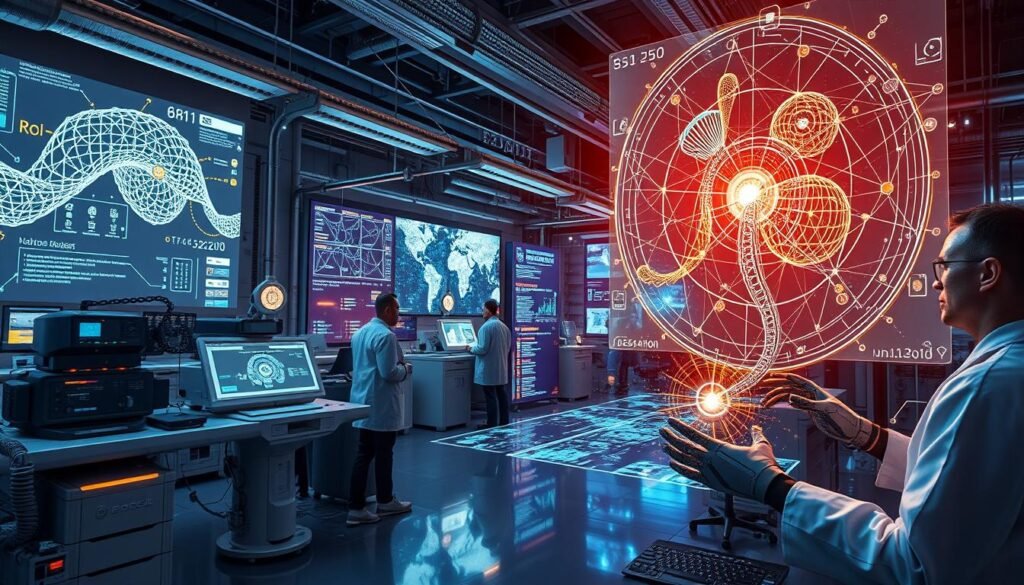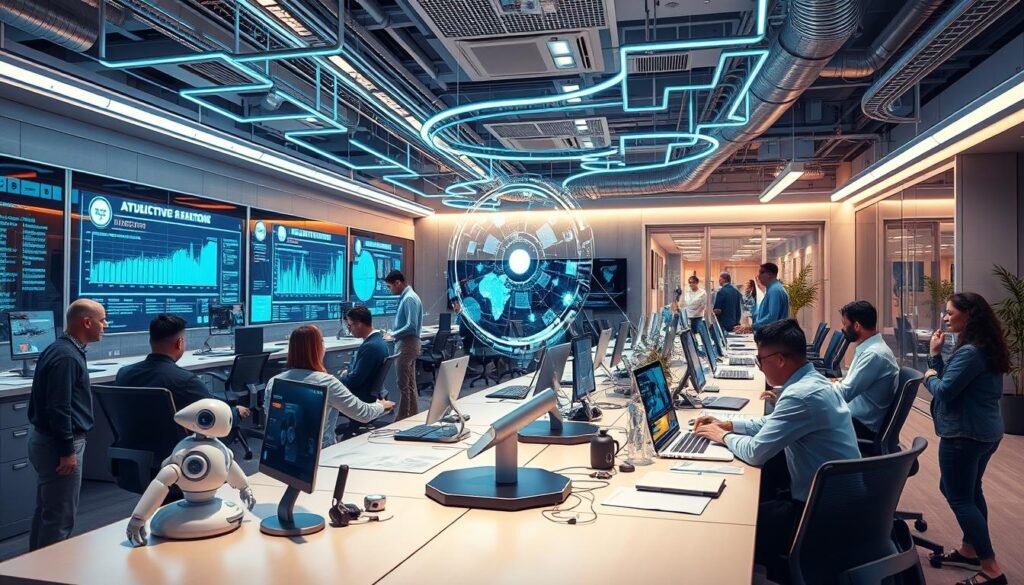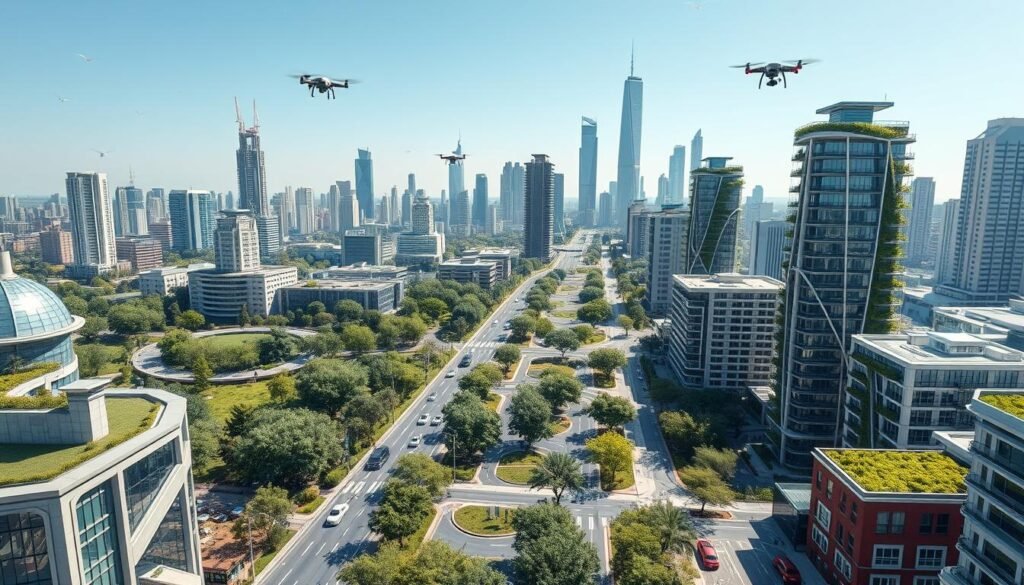Did you know that only 17 percent of 1,500 senior business leaders in the United States knew about artificial intelligence (AI) in 2017? This shows how much understanding and use of AI have changed in recent years1. Today, AI is changing the world, and it's expected to add $15.7 trillion to the global GDP by 20301. For businesses to stay ahead, it's key to understand how AI drives innovation.
This big change shows that every company needs to be a software company. A recent survey found that 34% of businesses are now using AI, a big jump that shows more companies see AI's value2. Also, almost 80% of people said AI outputs need to be fair, safe, and reliable, showing a shared goal for responsible AI2.
AI can look at huge amounts of data and find useful insights. This helps companies not just keep up but lead in many fields. These changes are making businesses work better and give customers what they want, showing AI's big impact1.
Key Takeaways
- • AI is expected to boost global GDP by $15.7 trillion by 2030.
- • Only 17% of business leaders were familiar with AI in 2017, showcasing rapid growth in awareness.
- • 34% of businesses have now adopted AI, reflecting its increasing significance.
- • 80% of respondents emphasize the importance of reliable AI outputs.
- • AI's data processing capabilities have transformed operational efficiencies across industries.
Introduction to the AI Revolution
The Introduction to AI marks a big change in how we do things today. It's changing how businesses work. With AI, companies can do things better and faster. This is true for many different areas3.
AI helps businesses work more efficiently. It uses special knowledge, data, and learning to make things better. This lets companies grow and change quickly3.
In the world of logistics, AI helps manage stock, predict sales, and find the best routes. This makes things run smoother3. AI chatbots also help by giving quick, personal help any time. This makes customers happy and saves money4.
AI is also changing jobs. It creates new roles and shapes the future of work4.
| Aspect | Description |
|---|---|
| Data Collection | AI changes how we collect and use data, leading to better insights and smoother processes3. |
| Efficiency Enhancements | AI makes things more efficient by automating tasks and giving smart product suggestions34. |
| Customer Experience | AI offers personalized experiences, helping keep customers happy and loyal in a tough market4. |
| Economic Growth | AI plays a big role in growing the global economy by opening up new markets and improving old ones4. |
Understanding Artificial Intelligence
AI is changing the game in many industries, making things more efficient. The AI market is expected to jump from $150.2 billion in 2023 to $1,345.2 billion by 20305. This huge growth shows how AI is making a big impact in fields like healthcare and finance. Companies are creating new jobs like AI specialists and robotics engineers, thanks to the need for AI skills5.
AI is set to make a big difference in how we work. It could automate up to 70% of tasks that are repetitive, making work more productive6. Knowing about AI, especially its machine learning, helps us understand how it works. It uses big data to make smart predictions, which is key for making good decisions7.
Exploring AI's impact shows it can lead to better decision-making and tailored advice. The key to Understanding AI is its power to improve operations and help companies rethink their plans. This leads to better use of resources and better results overall.
How AI Drives Innovation in Technology
AI is changing the digital world, making it more innovative. Companies use AI to improve how they work and serve customers. A big 71% of organizations are using AI in different ways8.
This shows AI's big impact on businesses in all fields.
The Impact of AI on Digital Transformation
AI makes processes smoother and boosts creativity. It automates tasks and cuts down on mistakes. This leads to better efficiency and productivity.
For example, ChatGPT-4 can come up with 800 ideas an hour. Human teams can only manage 20 ideas an hour8. This big jump in idea generation helps companies stay ahead in the market.
The Evolution of AI Technologies
Knowing how AI technology evolves is key for businesses. It lets them handle huge amounts of data fast. This helps make decisions based on trends and insights.
Also, AI can save money by using resources better and automating simple tasks. As AI gets better, it can offer more tailored solutions. This opens up new possibilities for innovation9.
Machine Learning Advancements
Machine learning is key in AI data processing. It uses advanced algorithms to quickly analyze huge datasets. This leads to better decision-making.
Data Processing and Analysis
Machine learning makes data processing better. It helps companies adapt to changes and improve their models. This is crucial for staying competitive in today's fast market10.
Using AI for data analysis can uncover new patterns. This drives innovation and boosts efficiency11.
Real-time Decision Making
Machine learning changes how we make decisions in real-time. Techniques like reinforcement learning enable systems to act fast based on current data10. This boosts efficiency and opens up new opportunities in many fields.
AI solutions help businesses react quickly to market needs. This keeps them ahead in fast-changing markets11.

AI-Powered Solutions Transforming Industries
AI is changing many sectors by making customer experiences better and operations more efficient. It helps companies streamline, personalize, and manage resources better. This is thanks to AI's fast growth in technology.
Personalized Customer Experiences
Artificial intelligence lets businesses tailor experiences for their customers. It uses natural language processing (NLP) and machine learning to understand what customers want. This way, it offers specific recommendations and marketing plans.
In retail, AI makes shopping better with personalized product suggestions and chatbots. It also predicts demand. This makes customers happier, boosts sales, and builds loyalty.
Enhancing Operational Efficiency
AI is key in making operations better in many fields. For example, in manufacturing, AI predicts when machines might fail, cutting downtime12. It also automates tasks, freeing up people for more important work13.
In finance, AI spots fraud, improves risk checks, and makes workflows smoother12. AI's impact is huge, making businesses more productive and saving money. It's a big deal in today's business world.
Intelligent Automation in Business Operations
Intelligent automation is changing how businesses work. It uses AI to make processes better. This lets companies focus on big plans and work more efficiently.
It makes things simpler and saves money. This helps businesses stay ahead in a changing world.
Streamlining Processes
Intelligent automation boosts productivity by cutting out manual tasks. It lets teams do more important work14. It includes AI, RPA, and BPM for better decision-making15.
In the car industry, it speeds up making cars and cuts down on mistakes15. It makes other areas like finance and healthcare better too, by making things more efficient and improving customer service.
Case Studies of Successful AI Integration
The insurance world uses it to make risk calculations easier and handle paperwork better1514. Retailers use AI to make shopping more personal, which makes customers happier14.
Companies with IA see lower costs, better accuracy, and easier rule following15. IA is key in many fields, helping companies meet today's needs and tomorrow's challenges.
| Industry | Application of Intelligent Automation | Benefits |
|---|---|---|
| Automotive | Speeding up production and resource efficiency | Reduced human error, increased productivity |
| Insurance | Calculating payments and risk assessments | Streamlined compliance and workflows |
| Healthcare | Automating medical coding and claims processing | Enhanced patient care and administrative efficiency |
| Retail | Personalized customer experiences and inventory management | Improved customer satisfaction and demand forecasting |
Data-Driven Insights: A Game Changer
In today's fast-changing market, knowing the value of data-driven insights is key. These insights help turn raw data into strategies that boost growth and efficiency. With AI, businesses focus more on using data as a vital asset. This change improves decision-making and helps companies stay ahead in a changing world.
Maximizing Data as a Critical Asset
Companies using AI make smarter choices that boost their success. For instance, predictive analytics helps retailers guess what customers want and manage stock better. This leads to happier customers and less waste16. AI also looks at past data to spot trends, guiding product and marketing plans16. Novo Nordisk shows how AI and machine learning can speed up finding new medicines, showing data's wide impact17.
Predicting Market Trends
Data analytics helps firms see market changes and grab new chances. AI boosts creativity in content and marketing, fitting what people like16. This lets companies adjust their plans to meet changing customer needs. In finance, AI changes how businesses talk to customers, making services more personal. Coles Supermarkets uses cloud data to make promotions better based on what people buy17.
AI Integration Strategies for Enterprises
For enterprises, effective AI integration strategies are key. They help unlock AI's full potential. AI works in three stages: data collection, model training, and evaluation. Each stage needs a tailored approach to meet business goals and solve specific challenges18.
Companies that adopt AI see big gains in efficiency and productivity. This keeps them ahead in fast markets. For example, over 40% of leaders say AI tools boost productivity, showing AI's value across sectors19.
Building a strong AI infrastructure is crucial. This includes investing in quality data. Research shows nearly 60% of healthcare companies use predictive analytics to create new products and services19.
Creating a culture of learning and adaptability is also key. Change can be hard, affecting jobs and processes. Training programs help overcome these challenges, ensuring smooth AI adoption20.
Aligning AI with business goals is vital for lasting success. Companies with clear AI objectives and use cases benefit from innovation more insights on AI integration. Ongoing efforts help them stay resilient against tech changes and market shifts.

The Role of AI Research and Development
AI research and development are key in changing many industries. They bring advancements in AI that change how things are done. Schools, startups, and big companies work together to find new tech. This teamwork leads to big improvements in AI and better lives for everyone.
When industries use AI in R&D, they see big wins. For instance, companies using AI come up with five times more ideas. They also do a better job of making these ideas real21. AI can also make research better by doing routine tasks and cutting down on mistakes22.
But, many companies still don't have a clear plan for AI in R&D. A survey shows 84% of companies don't have such a plan. Many are unsure about AI's power and what they need to change23. Looking into AI research and development shows the exciting future of AI and all the chances it offers.
AI and Emerging Technologies: The Future Ahead
AI is changing the game in many areas, making life better and industries more efficient. It's making a big splash in healthcare and transportation, two fields that are evolving fast.
AI in Healthcare and Transportation
In healthcare, AI is helping doctors find diseases quicker and find new medicines faster. It's also making treatments more personal, which means better health and fewer side effects24. In transportation, AI is working on self-driving cars, which could cut down on accidents and make travel smoother24. With more companies looking to use AI, we're seeing big changes in how we get care and travel25.
Smart Cities and National Security
In smart cities, AI helps manage resources and keep people safe. It uses data to plan better cities and keep them running smoothly25. AI is also changing national security, offering new ways to spot and deal with threats. More than half of companies are using AI, which means better security for everyone25.

| Sector | AI Applications | Impact |
|---|---|---|
| Healthcare | Faster diagnostics, personalized treatments | Improved patient outcomes |
| Transportation | Self-driving vehicles, AI-controlled drones | Enhanced traffic efficiency |
| Smart Cities | Resource management, public safety analytics | Sustainable urban development |
| National Security | Threat detection and response systems | Increased safety protocols |
As AI becomes more common, it's making our lives and work better. We're looking forward to a future filled with new ideas and solutions.
Conclusion
The AI revolution is changing many areas, making it key for today's businesses. It's changing how we work and market, making things better for customers26. With AI, companies can quickly understand big data, helping them make smart choices fast27.
AI is also changing the future of tech. It's helping businesses work better and faster, like coming up with 40 new ideas in seconds27. But, using AI right means working with it, not just using it. We need to deal with issues like bias and who gets credit for ideas26.
In the end, we're moving towards a good mix of human skills and AI power. This mix is key to solving problems and making new things. Your role in using these technologies is crucial. It will help shape a future where AI opens up new possibilities and drives progress in many fields.




